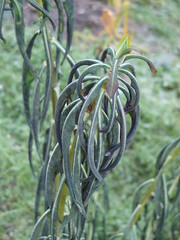Since Thanksgiving, I've overcome another episode of the cold/flu and done just about everything in my power to ensure that my prized potted specimens are safely protected from the sub-freezing temperatures we've been experiencing here in the Puget Sound area.
Sometimes I kick myself for having too many potted plants to winter over and having a diverse selection of them that seem to have different requirements and treatments. A large greenhouse of my very own would solve my dilemmas, but, yet again I go another year without having one constructed. I rent space at work and I have a colleague and former student who's letting me use her vacant, unheated greenhouse.
Perhaps it's the ongoing resilience of plants that continues to amaze me when I see them frozen out in the garden. Over the years, I've learned not to panic about many of my plants having a better understanding of what they endure at a cellular level.
Think of broadleaved evergreens such as this Rhododendron and Daphniphyllum, for example. The foliage has slowly acclimated to the cooling temperature and once we reach freezing temperatures, they get frosted and become almost like plant-popsicles. The plant's foliage curl up, look dessicated and appear to be goners. However, they've actually reached a state where water movement between cells slows down considerably, sugars become concentrated and the plant remains in somewhat of a dormant state until temperatures SLOWLY begin to warm up and metabolic processes resume. Often the danger is when plants are "warmed up" too fast and suddenly struck by freezing temperatures again. Plant cells walls burst at this point and plant tissues are damaged.


Of course plants will respond in all sorts of other ways because of where they came from and what they're genetically programmed to withstand in terms of stress.
This Euphorbia, for example, will probably die down to the ground and simply come back up in the spring when temperatures allow.

Stay warm, everyone!
R
No comments:
Post a Comment